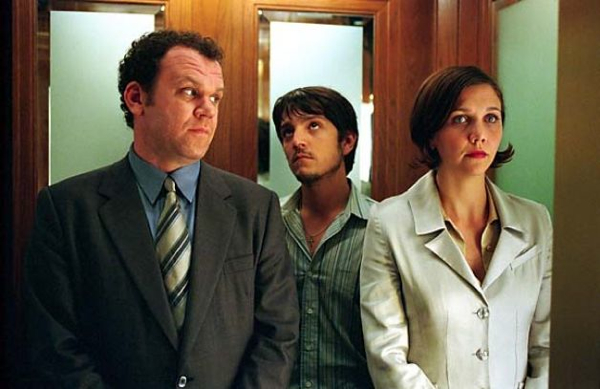Movie review by Greg Carlson
A remake of Argentinean helmer Fabian Bielinsky’s “Nine Queens,” “Criminal” is a decent if unremarkable addition to the oft-worked con genre. The new film’s chief strength is the opportunity to see John C. Reilly, an indispensable actor who can make good on darn near any character he plays, take center stage. He is certainly an actor who deserves an opportunity to headline a movie or two. “Criminal” is also the directorial debut of longtime Steven Soderbergh associate Gregory Jacobs, and the first-timer does not stylistically crib from his boss as often as one would guess he might. Con artist movies depend upon the element of surprise and the durability of the bait and switch. A thorough enjoyment of “Criminal” will depend largely on whether or not you have seen “Nine Queens.”
Reilly plays Richard Gaddis, a mid-level flimflam man accustomed to making small scores on unsuspecting marks. Working some turf at a Los Angeles casino, he impersonates a police officer in order to make contact with Rodrigo (Diego Luna), a blundering grifter who gets caught trying to cheat cocktail waitresses out of tens and twenties when they bring him his change. Gaddis takes Rodrigo under his wing, suggesting to the eager youngster a one-day trial partnership. Rodrigo laps up the attention: not only does he want to learn some of the tricks of the trade, he also says he needs to pay off a substantial gambling debt owed by his father to some rough customers.
Gaddis and Rodrigo spend a short segment of their day fleecing Westwood senior citizens and arrogant waiters, but the chance for a big score comes along with a phone call from Gaddis’ sister Valerie (Maggie Gyllenhaal). Valerie is a well-connected concierge at a swanky hotel, and she connects her brother with Ochoa (Zitto Kazann), a brilliant forger trying to unload a bogus silver certificate on a wealthy foreign collector (Peter Mullan). At this point, “Criminal” steps on the gas, and director Jacobs has a fine time speeding through the dizzying roundelay of switches, turnabouts, and backbites, as everyone demands a percentage of the eventual take.
Remakes theoretically offer filmmakers the opportunity to improve on the originals, but this seldom happens. Jacobs’ biggest mistake was to mostly ignore Gyllenhaal, who brings much-needed electricity to the film every time she is included in a scene. Unfortunately, the movie does not capitalize on Gyllenhaal’s presence, and she ends up relegated to a part that demonstrates the very model of “too little, too late.”
“Criminal,” like other movies of its type (Ridley Scott’s “Matchstick Men” is a good recent example), demands a certain leap of faith from its audience: when the final cons are revealed, brains start to shift into overdrive attempting to reconstruct the webbing that held it all together. Sure, some of the set-up incidents as depicted by Jacobs border on the outlandish, the illogical, and the far-fetched. Things are never really what they seem in the world of professional cheats, though, so one supposes that a filmmaker has as much right to mislead the audience as the swindlers who populate the story. The real trick of the con movie is to pull it off without having to defraud the viewers. “Criminal” does not quite manage to do that.
